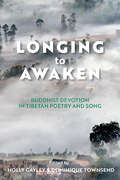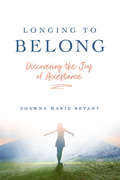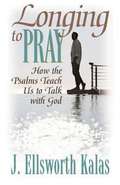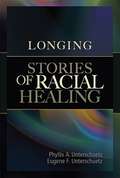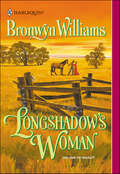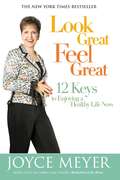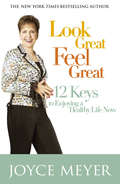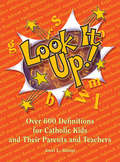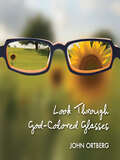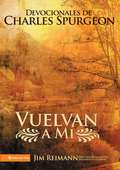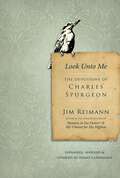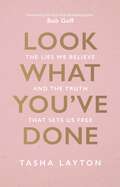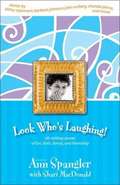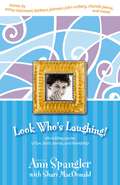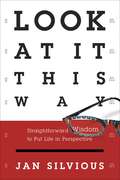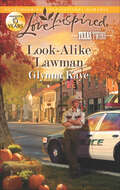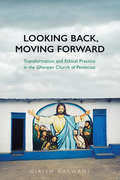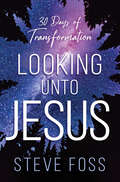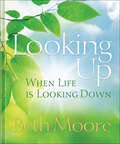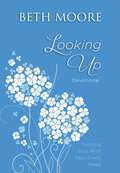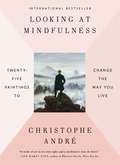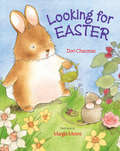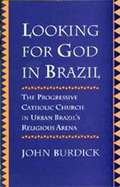- Table View
- List View
Longing to Awaken: Buddhist Devotion in Tibetan Poetry and Song (Traditions and Transformations in Tibetan Buddhism)
by Holly Gayley Dominique TownsendAn indispensable collection of Buddhist devotional poems and songsLonging to Awaken features twenty-five translations of Buddhist devotional poems and songs composed by revered Tibetan masters from diverse traditions and time periods. The anthology invites readers to experience a variety of poetic forms that embody a range of emotions, from grief and longing to skepticism and humor, demonstrating the ways that poetry can inspire faith as well as reflect the profundity and at times fraught nature of the teacher-student relationship. This collection gives weight to literary—not simply literal—translation as a crucial endeavor in the transmission of Buddhism today, one with the potential to raise the profile of Tibetan poetry onto the stage of global literature. Featuring a remarkable interview with esteemed Tibetan master Jetsün Khandro Rinpoché to elucidate Buddhist devotion and a landmark essay by Lama Jabb articulating a Tibetan theory for translating poetry.
Longing to Belong: Discovering the Joy of Acceptance
by Shawna Marie BryantBecome fully aware that you are unconditionally loved and accepted. From a young age, we all learn that cruel words can wound, but Longing to Belong will show you how Scripture can heal your heart. Join Shawna as she turns to Psalm 139 and reveals seven life-giving affirmations that everyone needs: God knows me. He is always with me. I am not invisible. I am wonderfully made. God’s countless thoughts are for me. I have enemies, but . . . I can walk in victory! Writing with honesty and transparency, Shawna will show you how to handle your hurts and grasp the keys to freedom when others have rejected you. Walk with her through the Bible and see anew that your Creator is not a harsh critic or a taskmaster to be feared. Instead, learn to claim your rightful place as accepted by God and live in joy.
Longing to Pray: How the Psalms Teach Us to Talk with God
by J. Ellsworth KalasFrom the Foreword - This little book invites us to study with some ancient experts in prayer, the persons who wrote the Book of Psalms. We haven't read long in the psalms before we realize that the authors were altogether human, with a massive catalog of troubles, inconsistencies, and questions. Their lives were marked by breathtaking highs and lows, with sometimes only a few paragraphs between. But with all of that, they were saints. They left us with the greatest collection of prayers in the possession of our human race.What was their secret? I believe it was the quality of their friendship with God. And of course the language of that friendship is prayer. The psalmists don't give us any formula for effective praying. They don't offer a set of rules. But if we read their prayers carefully, we will learn something of their secret, the secret of the Ultimate Friendship. I hope through this book to start us on that special journey.---- J. Ellsworth KalasThe book will contain a disussion guide by John Schroeder
Longing: Stories of Racial Healing
by Phyllis A. Unterschuetz Eugene F. UnterschuetzA white couple's personal account of a ten-year journey that forced them to reconsider their comfortable notions about race as they forged new relationships with people of African descent. Their stories describe a longing to heal from the racial separation that has so deeply wounded this country.
Longshadow's Woman
by Bronwyn WilliamsJonah Longshadow had never walked an easy road. Now the hands of destiny had yanked him from a white man's prison and set him down on a hardscrabble farm, paired with a woman whose quiet courage and gentle kindness filled him with dreams that a man like him had no business dreaming.....Two dollars' worth of trouble-that's what Carrie Adams had probably bought herself when she paid Jonah Longshadow's freedom. But she needed strong hands to help her tend her land, and this mountain of a man seemed made to order. The only thing she hadn't counted on was her heart entering into the bargain.
Look Great, Feel Great: 12 Keys to Enjoying a Healthy Life Now
by Joyce MeyerThe bodies God gives are instruments for experiencing a fulfilling life on earth, for doing good works, for spiritual development. To do the work individuals are meant to do, they need to keep in shape. They must maintain a sound mind, body, and soul. Yet in the modern world, it is all too easy to let one, two, or all three of these slip. LOOK GREAT, FEEL GREAT presents Joyce's twelve-key plan to address the epidemic of "self esteem drought" that appears to be a factor in perpetuating habits that create poor health. Additionally, Joyce will provide helpful resources, like the "Ounce of Prevention Checklist," for self-maintenance.
Look Great, Feel Great: 12 keys to enjoying a healthy life now
by Joyce Meyer'I wrote Look Great, Feel Great, because I can truthfully say that I feel better physically, mentally, emotionally and spiritually right now than I have ever felt in my life.''No matter what age or condition you are in, you can do the same.'Joyce Meyer's acclaimed New York Times bestseller: - Provides a twelve-key plan for overcoming the poor eating and exercise habits that prevent us from fulfilling our potential - Demonstrates the amazing spiritual benefits of a healthier lifestyle - Digs beneath the self-respect crisis that threatens society today - Includes a Daily Self-Maintenance Checklist and Quick-Fix Emergency Sheet
Look It Up!
by Janet L. AlampiThis dictionary explains important words of the Catholic faith. Set up in a kid-friendly format, Look It Up! incorporates clip art and pronunciation aids to promote learning. This book is perfect for kids ages 10 14, and their parents and teachers looking for quick responses to those difficult questions kids ask! An indispensable resource for Catholic families, libraries, schools, and parishes. Winner of a Catholic Press Association Award!
Look Through God-Colored Glasses
by John OrtbergIt’s easy to recognize God in a church service or while attending a wedding or a funeral. But it’s easy to forget about Him in the busyness of our daily lives. This gift book encourages the reader to notice God in the everyday happenings around us. Whether it’s a smile from a co-worker, the love of a spouse, the sound of the ocean, or a look at the stars, it all speaks God’s name if we just take the time to see and listen. Content is excerpted from God Is Closer Than You Think by John Ortberg.
Look Unto Me: The Devotions of Charles Spurgeon
by Jim ReimannFrom the pen of Charles Spurgeon: This year we will gather heavenly fruit on earthly ground, where faith and hope have turned the desert into the Lord’s garden. If “men ate the bread of angels” (Ps. 78:25) long ago, why not today? May God grant us the grace to feed on Jesus, and thereby eat of the fruit of the land of Canaan this year! Whether you are familiar with the works of this classic Christian author or discovering him for the first time, Look Unto Me offers a treasury of spiritual insight and inspiration. Charles Haddon Spurgeon was known as the Prince of Preachers, stirring audiences from his London pulpit from 1854 to 1892. Millions more who never heard him preach read his weekly sermons. Based on Spurgeon’s original devotional, Morning by Morning, Look Unto Me has now been edited for the modern reader with updated language and additional application commentary by bestselling author, Jim Reimann. Look Unto Me offers 366 of Spurgeon’s most powerful devotions, modernizing the language without changing the meaning and adding Scripture references and quotes in the NIV. Jim Reimann, editor of updated editions of Streams in the Desert and My Utmost for His Highest, has also added thought-provoking comments to deepen your understanding of the text, other Scriptures to consider, as well as application and closing prayers. This new edition also includes these new features: • Scripture quotes referenced in the context of each devotion • Scripture and subject indexes • Hymn quotes referenced with composer names and dates The material is profound, thought-provoking, and life-changing, but easy to follow. With Scripture references from literally every book of the Bible, this is the perfect book to help you dig deeper into God’s Word and be challenged to expand your faith. If you long for a deeper walk with Christ and a richer understanding of the Christian faith that can be applied to everyday living, Look Unto Me is the devotional you’ve been waiting for.
Look Unto Me: The Devotions of Charles Spurgeon
by Jim ReimannFrom the pen of Charles Spurgeon:This year we will gather heavenly fruit on earthly ground, where faith and hope have turned the desert into the Lord’s garden. If “men ate the bread of angels” (Ps. 78:25) long ago, why not today? May God grant us the grace to feed on Jesus, and thereby eat of the fruit of the land of Canaan this year!Whether you are familiar with the works of this classic Christian author or discovering him for the first time, Look Unto Me offers a treasury of spiritual insight and inspiration. Charles Haddon Spurgeon was known as the Prince of Preachers, stirring audiences from his London pulpit from 1854 to 1892. Millions more who never heard him preach read his weekly sermons. Based on Spurgeon’s original devotional, Morning by Morning, Look Unto Me has now been edited for the modern reader with updated language and additional application commentary by bestselling author, Jim Reimann. Look Unto Me offers 366 of Spurgeon’s most powerful devotions, modernizing the language without changing the meaning and adding Scripture references and quotes in the NIV. Jim Reimann, editor of updated editions of Streams in the Desert and My Utmost for His Highest, has also added thought-provoking comments to deepen your understanding of the text, other Scriptures to consider, as well as application and closing prayers. This new edition also includes these new features:• Scripture quotes referenced in the context of each devotion• Scripture and subject indexes• Hymn quotes referenced with composer names and datesThe material is profound, thought-provoking, and life-changing, but easy to follow. With Scripture references from literally every book of the Bible, this is the perfect book to help you dig deeper into God’s Word and be challenged to expand your faith. If you long for a deeper walk with Christ and a richer understanding of the Christian faith that can be applied to everyday living, Look Unto Me is the devotional you’ve been waiting for.
Look What You've Done: The Lies We Believe & The Truth That Sets Us Free
by Tasha LaytonFrom Dove Award-nominated artist Tasha Layton, Look What You&’ve Done is a diverse collection of stories and intimate self-reflections to encourage readers to follow where God leads them. Inspired by her powerful song of the same title, Look What You&’ve Done delves into Tasha&’s journey of finding freedom in Jesus through life's twists and turns. Tasha takes readers through her early days in small town South Carolina, to her big breakthrough as background singer on stage with Katy Perry, to the mission field in Kenya and beyond. Across many countries and all her days, the truest constant in Tasha&’s life has been the presence of God in both the highs and the lows. As her inspirational stories reveal the ways God has guided her journey, Tasha also shares vulnerable reflections on the struggles she&’s faced in her life of faith and music. Readers will identify with Tasha as she describes the lies that she allowed herself to believe as she struggled with comparison, self-image, and the uncertainty of finding her purpose. Through challenges like these, God continues to bring Tasha wisdom and truth regarding who He is, and who she is meant to be. Look What You&’ve Done helps readers to: - Discern God&’s truth from the world&’s lies - Find freedom, truth, security, and identity in Jesus - Become increasingly bold in prayer - Live as a Christian in an uncertain world - See God&’s miracles in their life - Begin to embrace seasons of waiting Look What You&’ve Done: The Lies We Believe & The Truth That Sets Us Free will inspire you to walk in boldness and love, sharing the goodness of God revealed in your life.
Look Who's Laughing
by Shari Macdonald Ann Spanglerrib-tickling stories of fun, faith, family, and friendship
Look Who's Laughing!
by Shari Macdonald Ann SpanglerThe best of the best—stories, one-liners, and jokes from some of today’s funniest Christian speakers and best-selling writers This new book, like its best-selling predecessors, is packed with the kind of smiles and smirks, chuckles and giggles that thousands of readers have come to love and expect. It includes some of the funniest stories from today’s Christian writers like Barbara Johnson, John Ortberg, Mark Buchanan, Patsy Clairmont, Becky Freeman, Chonda Pierce, and more. Whether the topic is kids, marriage, pets, church, parenting, aging, or life’s most embarrassing moments, the writers will help you keep life in perspective by revealing their own foibles, follies, and failings. Realizing that laughter and faith can go hand in hand, they offer real-life anecdotes that will keep your world in balance even—and especially—when life gets tough.
Look at It This Way: Straightforward Wisdom to Put Life in Perspective
by Jan SilviousEach person has his or her own particular way of looking at life: a kind of grid that helps readers process whatever comes their way. Though this grid can be a helpful tool, far too often it is a weight around the neck. So what can be done about it? How can readers change their perspectives–replacing the grid that drags them down with one that equips them to face life’s challenges and live victoriously? InLook at It This Way,author and speaker Jan Silvious explores, in-depth, vital truths that can help Christians reframe the way they think: breaking them out of their self-pity, anger, depression, anxiety and hopelessness, and equipping them to deal with the events, circumstances and people in their lives in a healthy and positive way. Jan highlights such key truths as “Whatever happens, it’s one event in a lifetime of events,” “For every choice there is a consequence,” “God isn’t angry with you,” “The last chapter has not been written,” and eight others. Deeply rooted in Scripture, these valuable insights will give readers hope and real help for managing their thinking, showing how they can, at last, move forward with the courageous and grace-filled life God intended them to live. From the Hardcover edition.
Look-Alike Lawman (Texas Twins)
by Glynna KayeIn this inspirational romance, an urban police officer discovers a twin brother he never knew—and falls for a single mom—in a small Texas town. When big-city cop Grayson Wallace visits an elementary school for career day, he finds his heartstrings unexpectedly tugged by a six-year-old fatherless boy. Gray offers to mentor the child, but widowed mother Elise Lopez wants nothing to do with men in uniform. Now he can't get the struggling Lopezes off his mind. All he can think about is what family means—especially after discovering the identical twin brother he hadn't known he had in Grasslands. Maybe a trip to ranch country is just what he, Elise and little Cory need.
Lookin' for Love: A Novel
by Susen EdwardsBased on a compelling and sometimes tragic true story, this novel follows young mother Ava from the go-go bars of the 1970s to the heart of Florida&’s drug trade to a Kenyan prison to, ultimately, a place of forgiveness, faith, and love through recovery.Inspired by a gripping true story, Lookin&’ for Love begins in 1963, when Ava, nineteen and pregnant, marries a violent alcoholic and is disowned by her abusive mother. She bears two sons, leaves her husband, and turns to go-go dancing to provide for her children, using alcohol and drugs to numb herself to the degrading work. Then she meets Mike, a charismatic drug dealer who promises to give her &“a beautiful life.&” They move to Florida and begin working for The Crew, one of the largest drug smuggling organizations in the country. The Crew sends Ava and Mike to Kenya to find farmers to grow marijuana—but while they&’re there, their home is raided, they&’re charged with international drug smuggling, and Ava is sentenced to serve time in a Kenyan prison. After her release, Ava struggles with sobriety but soon returns to dancing, alcohol, and drugs. Eventually, she hits bottom and surrenders her will to God. Once sober, she learns the power of forgiveness, faith, and love.
Looking Back, Moving Forward
by Girish DaswaniHow do Ghanaian Pentecostals resolve the contradictions of their own faith while remaining faithful to their religious identity? Bringing together the anthropology of Christianity and the anthropology of ethics, Girish Daswani's Looking Back, Moving Forward investigates the compromises with the past that members of Ghana's Church of Pentecost make in order to remain committed Christians.Even as church members embrace the break with the past that comes from being "born-again," many are less concerned with the boundaries of Christian practice than with interpersonal questions - the continuity of suffering after conversion, the causes of unhealthy relationships, the changes brought about by migration - and how to deal with them. By paying ethnographic attention to the embodied practices, interpersonal relationships, and moments of self-reflection in the lives of members of the Church of Pentecost in Ghana and amongst the Ghanaian diaspora in London, Looking Back, Moving Forward explores ethical practice as it emerges out of the questions that church members and other Ghanaian Pentecostals ask themselves.
Looking Unto Jesus: 30 Days of Transformation
by Steve FossThere is nothing that transforms the human heart like the revelation of the person of Jesus Christ. After reading this book, you will understand the characteristics of Jesus that have the power to demolish and destroy all the shameful attacks of the enemy that get thrown in your direction.There are countless sermons offering strategies for overcoming your past, building unshakable faith, or experiencing breakthrough. But there is nothing that can transform the human heart like the revelation of the person of Jesus Christ.In Looking Unto Jesus: Thirty Days of Transformation, Steve Foss will take you on a journey discovering thirty incredible descriptions of Jesus found in Revelation 1. These depictions unveil &“the light of the knowledge of the glory of God in the face of Jesus&” (2 Cor. 4:6). Only as you see Jesus as He is will you be able to stand strong in these days of increasing crisis.This book will take you into the deep and intimate knowledge of Jesus&’ character, nature, authority, and coming kingdom. Through this thirty-day journey, you will learn the power behind certain characteristics of Jesus, such as:The faithful witnessThe firstborn from the deadHis eyes like a flame of fireWe are living in a time when God is opening His Word like never before and unveiling the greatest revelation of Jesus Christ the world has ever known. Through these thirty days of transformation, as you focus on Jesus and what He is focused on, the end of the age, you will be empowered and transformed from glory to glory.
Looking Up When Life Is Looking Down
by Beth MooreWhen life is looking down, look up and find God’s deliverance!Life can be hard…sometimes to the point of feeling as though your struggles will never end and God isn’t anywhere near. In Looking Up When Life is Looking Down, Beth Moore shares a prosaic message of hope and deliverance taken from Psalm 40, helping readers discover they indeed are not alone and that God’s gracious provision of love and faithfulness is at work in their circumstances. This lovely full-color gift book is based on Beth Moore's best selling book, Get Out of That Pit.
Looking Up: Trusting God With Your Every Need
by Beth MooreWhen life is looking down, look up and find God's deliverance!Life can be hard . . . sometimes to the point of feeling as though your struggles will never end.Looking Up Devotional is bestselling author Beth Moore's timeless message of hope and deliverance taken from Psalm 40 in a new deluxe edition. Each entry includes a verse, a daily reading, and a prayer. You'll discover you are indeed not alone, and that God's gracious provision of love and faithfulness is at work, pointing you toward a life of wholeness. Daily readings gently lead you into His arms finding lasting purpose and peace.Content for this devotional was adapted from Beth's bestselling book Get Out of That Pit.Trim Size: 5 x 7
Looking at Mindfulness: 25 Ways to Live in the Moment Through Art
by Christophe AndreStop doing, stop moving, stop twisting and turning. <P><P>These are the first steps toward inner calm and increased mental clarity, says psychiatrist and leading meditation practitioner Christophe André, whose book guides readers through the art of mindfulness beginning with art itself. Beautifully illustrated in color throughout, André curates a collection of classic and esoteric works, from Rembrandt to Hopper to Magritte, providing a lucid commentary on the inner workings of each painting--as he describes the dynamic on the canvas, he turns to the reader's own reactions, exploring the connection between what we see and what we feel. <P>Moving beyond the art on the page, André teaches us what it means to consider our surroundings, our daily interactions and obligations, and their effect on our inner well-being. The paintings are a visual and tangible first step to understanding mindfulness and the benefits of living in the moment. In practicing mindfulness, within ourselves and outside in the world, each of us can make immediate, meaningful and permanent changes in our wellbeing and the wellbeing of others.<P>From paying attention to our breath to accepting unhappiness as a part of life rather than a personal shortcoming, Looking at Mindfulness reminds us to stop rushing through the present and to embrace the things we deem ordinary as important and fulfilling. It challenges us to stop and use our senses - the only five tools we really need - and acknowledge the world around us and within us. Gently and thoughtfully, it reminds us to take notice, to digest, and to reflect.Beautifully written, wonderfully accessible for any novice or expert, Looking at Mindfulness delivers practical steps and a comprehensive understanding of the practice and meaning of mindfulness and meditation.
Looking for Easter
by Dori Chaconas Margie MooreLittle Bunny can sense something new in the air, and it smells like sunshine and warm breezes. "It smells like Easter!" his friends tell him. But Little Bunny wonders: what is Easter? So he sets out through the forest on an early spring day to find out . . . This sweet, simple story by Dori Chaconas conveys the spirit of the season through nature, while Margie Moore's gentle, detailed watercolors reveal the new life of springtime.
Looking for God in Brazil: The Progressive Catholic Church in Urban Brazil's Religious Arena
by John BurdickFor a generation, the Catholic Church in Brazil has enjoyed international renown as one of the most progressive social forces in Latin America. The Church's creation of Christian Base Communities (CEBs), groups of Catholics who learn to read the Bible as a call for social justice, has been widely hailed. Still, in recent years it has become increasingly clear that the CEBs are lagging far behind the explosive growth of Brazil's two other major national religious movements—Pentacostalism and Afro-Brazilian Umbanda. On the basis of his extensive fieldwork in Rio di Janeiro, including detailed life histories of women, blacks, youths, and the marginal poor, John Burdick offers the first in-depth explanation of why the radical Catholic Church is losing, and Pentecostalism and Umbanda winning, the battle for souls in urban Brazil.
